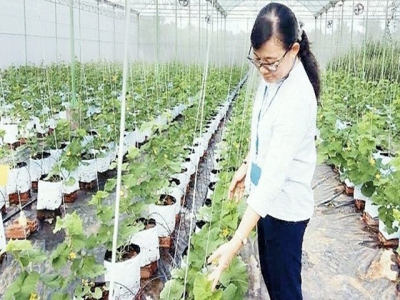Encouraging enterprises to invest in agricultural development

A high-tech cucumber cultivation model in the Mekong Delta province of Ben Tre. (Photo: NDO/Tam Thoi)
In 2018, despite enormous competition pressure from markets around the world, Vietnam's agricultural export turnover still rose strongly, reaching a record of over US$40 billion.
This triumph once again confirms that the restructuring of Vietnam's agricultural sector is on the right track.
In the past few years, the sector has implemented both macro and micro solutions intertwined to build pillars to maintain its steady growth. One of those backbones is a collective of enterprises active in the production and processing activities in both agricultural and rural areas.
In the past three years, the number of businesses investing in the agricultural sector has increased three fold. In 2018 alone, the relevant socio-economic entities invested more than VND10 trillion (US$431 million) in agriculture. Vietnam currently has 7,500 industrial processing enterprises for agro-forestry and fishery products.
More importantly, in all stages of production, processing, trading and expanding export markets, businesses are the subjects and "leaders" leading farmers and the agricultural sector, which individual and household economics cannot do.
Several businesses operating in the field of production and processing, such as Lam Son Sugarcane (Thanh Hoa province), Dong Giao Food Export (Ninh Binh province) and TH Truemilk (Nghe An province), have linked with tens of thousands of farmers to facilitate raw material production and processing agricultural products and goods.
Furthermore, in industries that have a positive export turnover of over US$9.3 billion such as forestry, wood processing enterprises are supporting forest planters with Forest Stewardship Council Certification, thus enabling raw materials to be purchased at higher prices and wood products to be exported to fastidious markets. Similarly, in the processing and exporting of shrimp, fish and seafood products, enterprises are also playing a key role.
However, there are also issues worth discussing concerning the business capacity. For example, in the northern region, enterprises that are operating in agricultural, forestry and fishery processing account for 23.66% of the country's total, but the value of their processed products only accounts for 15%. They are mainly seafood, rice, vegetables, fruits, tea and furniture products which serve domestic use, with modest processing technologies. Particularly, in the tea industry, the region’s processing capacity is still limited, combined with small scale production with most of the output being raw processed products (70 to 80%).
In order to solve the above difficulties, in recent years, the State has issued multiple policies to encourage businesses to invest in agriculture, with a number of new changes to facilitate investment in this area, such as removing problems in administrative procedure reform, promoting the movement of building modern rural areas and actively accumulating land.
Notably, the Comprehensive and Progressive Agreement for Trans-Pacific Partnership (CPTPP) coming into force in Vietnam in January is expected to create a huge opportunity to help the agricultural sector to develop sustainably, thanks to the opening of several fastidious markets with high value added under the CPTPP.
Recently, Japan has expanded its economic cooperation with Vietnam in agricultural production, making it feasible for Vietnam to become a key supplier of several agricultural products for more than 120 million Japanese people. This is considered a good opportunity for Vietnamese agriculture to step out of its dependence on certain traditional markets.
Related news
 Agricultural sector seeks ways to improve productivity, quality
Agricultural sector seeks ways to improve productivity, quality To achieve sustainable development, Việt Nam’s agriculture sector must improve productivity and quality, and identify markets for its products, experts said at
 Popularity of organics catching attention
Popularity of organics catching attention Investment is coming from both local and foreign enterprises into organic farming and aquaculture as demand continues to exceed supply.
 Instant coffee, instant results
Instant coffee, instant results Coffee exports are expected to reach US$3.5 billion in 2018, Luong Van Tu, Chairman of the Vietnam Coffee - Cocoa Association (VICOFA)